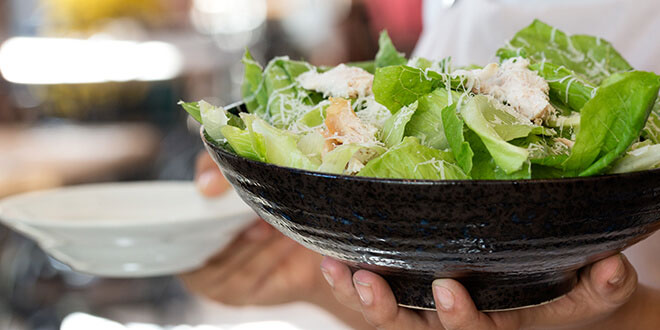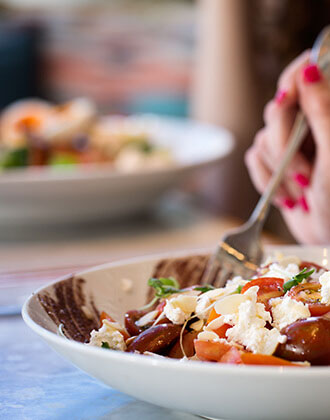Sean, living with an ileostomy: I really haven’t made any changes to my diet after having the ostomy. I have no diet restrictions and I can eat whatever I want. Now, one thing I would suggest is, just chew your food well..
In general, the food that was good and healthy for you before your surgery is still good for you – and the same goes for the more unhealthy options. A well-balanced diet is recommended, but this could very well include all of your favourite foods.

Eating small portions is still a good idea
Right after surgery your ostomy care nurse probably gave you some advice about not eating too large meals at a time initially. You may still feel better if you try to eat smaller portions, but you can try to eat more often, as you gradually build up your digestive system.
It is really important that you try to listen to your body and make sure you have regular meals, as this will help you have a more predictable bowel movement.

Stay in balance
It is important for you to get plenty of water to stay properly hydrated. Because of your ileostomy, your body will absorb less of the water you drink, so you will probably need to drink 2-3 litres of fluid every day, depending on the volume of output.
You will probably find that certain foods produce more wind than others, and although it is not harmful, you may want to cut down on these foods. The same applies to chewing gum. But remember: It will only take a little experimentation to find a balanced diet that feels right for you.
Alcohol and caffeinated drinks
Alcohol is fine in moderation, although carbonated drinks in general can produce wind. Similarly, tea and coffee is fine, but be aware of any reactions in your digestive system.
Remember to chew carefully
Chewing carefully is very important to get a proper start to the digestive process. This applies especially if you eat foods that are hard to digest (such as nuts).
Some foods, especially high fibre foods, can cause a food blockage, where undigested parts of food block the bowel. Chewing well can help, but a food blockage can be quite serious. It can cause cramping, pain and watery output, and your abdomen and ostomy may become swollen.
If you think you have a food blockage, you should call your doctor or ostomy care nurse or go to an emergency room.



